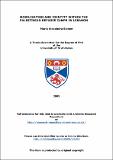Files in this item
Mobilisation and identity within the Palestinian refugee camps in Lebanon
Item metadata
| dc.contributor.advisor | Richmond, Oliver P. | |
| dc.contributor.author | Siemer, Maria Alexandra | |
| dc.coverage.spatial | vii, 349 leaves | en_US |
| dc.date.accessioned | 2017-06-28T12:41:43Z | |
| dc.date.available | 2017-06-28T12:41:43Z | |
| dc.date.issued | 2005 | |
| dc.identifier | uk.bl.ethos.521513 | |
| dc.identifier.uri | https://hdl.handle.net/10023/11104 | |
| dc.description.abstract | This thesis examines political mobilisation into secular groups within Palestinian refugee camps in Lebanon. It focuses on context and identity in order to find out why and how Palestinians in the camps mobilise into these groups. The thesis uses a framework that incorporates three levels of analysis: structural; organisational; and individual. An ethnographic methodology is deployed involving interviews and participant observation in refugee camps in Lebanon. The thesis starts by looking at what sort of theoretical framework is necessary in order to understand the three key levels of analysis, including literature focusing on opportunities and constraints; human needs; resources; recruitment; social construction; and identity. The next focus is on context, looking at both the legal issues surrounding refugees - international, regional and local - as well as the historical context. The last three chapters examine the three levels of analysis individually, using them in conjunction with ethnographic research data to find out why and how Palestinians in the camps mobilise. The conclusion shows that, contrary to what one would imagine from most of the mobilisation literature, the Palestinians in the camps are not mobilising as would be expected. Instead the ethnographic research results found that the political groups within the camps are not as politically and militarily active as would be presumed. Mobilisation into these political groups is happening for different reasons than in previous findings – focusing instead on solidarity and social issues. This change has happened for contextual and financial reasons, including the end of the Civil War and the Palestinian Revolution in Lebanon, as well as a severe lack of resources available to the political groups. The research results found that although there is still mobilisation into the political groups, there was also disillusionment among many youths at the political groups' inability to facilitate their return to Palestine from Lebanon, as well as dismay at what they saw as disunity between the Palestinian political groups. | en_US |
| dc.language.iso | en | en_US |
| dc.publisher | University of St Andrews | |
| dc.subject.lcc | HV640.5P36S5 | |
| dc.subject.lcsh | Refugees, Palestinian Arab--Lebanon--Politics and government | en |
| dc.subject.lcsh | Refugees, Palestinian Arab--Lebanon--Social conditions | en |
| dc.subject.lcsh | Refugee camps--Lebanon | en |
| dc.title | Mobilisation and identity within the Palestinian refugee camps in Lebanon | en_US |
| dc.type | Thesis | en_US |
| dc.type.qualificationlevel | Doctoral | en_US |
| dc.type.qualificationname | PhD Doctor of Philosophy | en_US |
| dc.publisher.institution | The University of St Andrews | en_US |
This item appears in the following Collection(s)
Items in the St Andrews Research Repository are protected by copyright, with all rights reserved, unless otherwise indicated.

